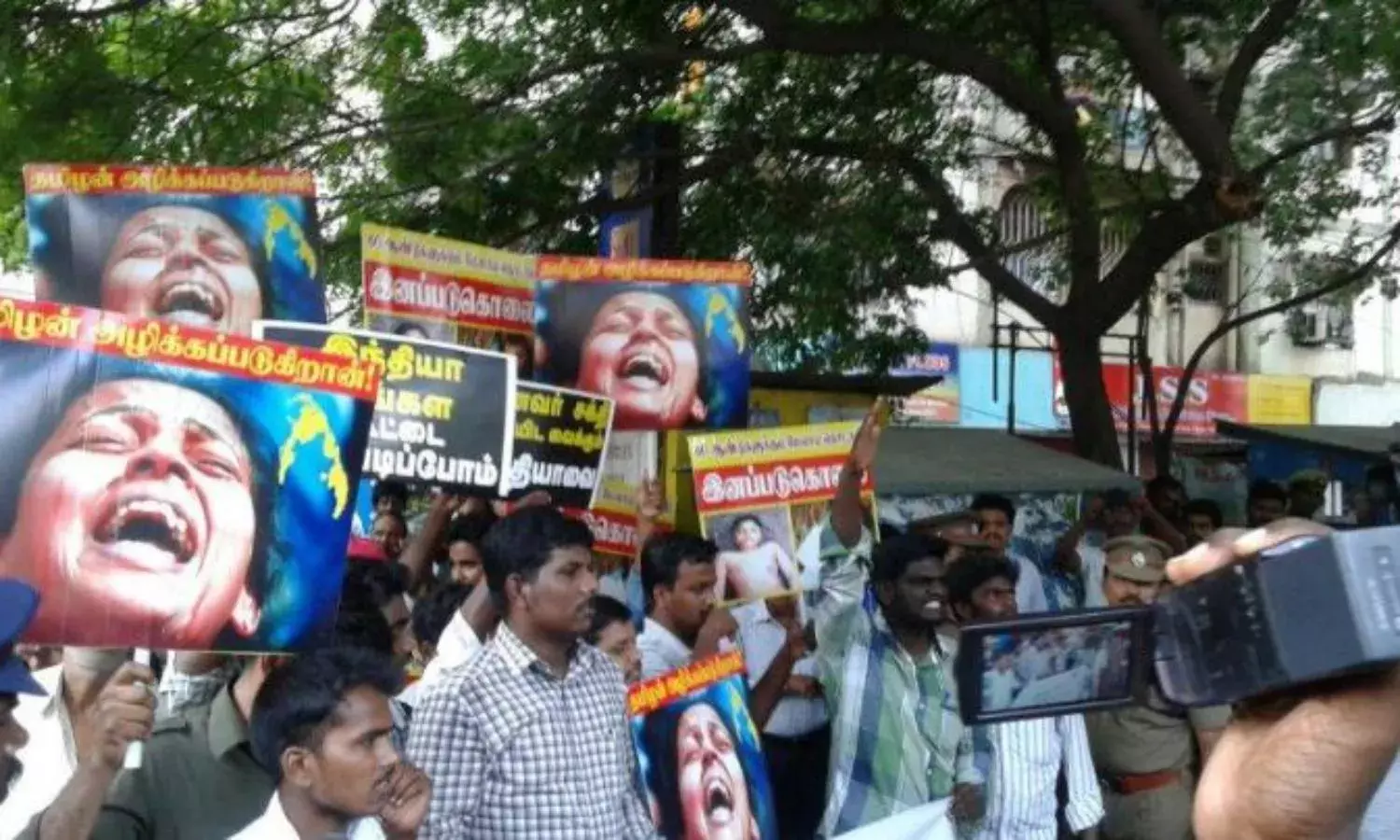‘War Criminal Go Back!’ Petitioners Protest Mahinda Rajapaksa Invite
Rajapaksa to address The Huddle in Bangalore
NEW DELHI: With former Sri Lankan President Mahinda Rajapaksa set to address a ‘thought conclave’ being held at the ITC Gardenia hotel in Bangalore on February 9 and 10, a group of concerned Indians has registered a strong protest against the invitation extended to the ‘war criminal’.
At the conclave, organised by The Hindu newspaper, the chief guest’s address will be delivered by Vice-President Venkaiah Naidu, formerly union minister, president of the Bharatiya Janata Party and member of the Rashtriya Swayamsevak Sangh.
According to The Hindu’s retiring editor Mukund Padmanabhan, “At a time of extreme social and political polarisation, this thought platform hopes to promote genuine debate by providing a place for reflection, for nuance, for evaluating the views of others even as we prepare to re-examine our own.”
An annotated copy of the petition follows.
NO INVITATION TO MAHINDA RAJAPAKSA! WAR CRIMINAL GO BACK!
We the undersigned strongly condemn the invitation to Mahinda Rajapaksa, war criminal and former President of Sri Lanka, to deliver the inaugural address at the “The Huddle”, an annual conclave organized by The Hindu in Bangalore.
The conclave, according to The Hindu, is a “thoughts and ideas conclave, a platform that attempts to bring under a single roof some of the best minds from politics, academia, the entertainment industry, the corporate world, sports and civil society”.
Inviting Mahinda Rajapaksa to the event, is an insult to the memory of over 1,40,000 innocent Tamil civilians killed by Sri Lankan armed forces in the last few months of the civil war in 2009. Rajapaksa was one of the main architects of the Eelam Tamil genocide, condemned by human rights groups around the world.
Nearly three lakh Eelam Tamils (Tamils from the north and east of Sri Lanka) displaced by war were herded into concentration camps and underwent torture and abuse at the hands of the military. Many of those who surrendered have not been seen again. Thousands of victims of Rajapaksa’s war are still living in Tamil Nadu as refugees.
The Sri Lankan government headed by Mahinda Rajapaksa maintained that the war did not have any civilian casualties. But various independent accounts and United Nations reports have confirmed that the Sri Lankan military targeted civilian structures and ‘No Fire Zones’, with the only aim of maximizing the killings of Tamil civilians.
The 2010 Permanent Peoples’ Tribunal session in Dublin was the first to charge the Sri Lankan government with war crimes, with the set of limited evidences that was available at the time.
The 2011 Report of the UN Secretary-General's Panel of Experts on Accountability in Sri Lanka concluded that “the conduct of the war represented a grave assault on the entire regime of international law designed to protect individual dignity during both war and peace”, and also called for an independent international investigation by the UN Secretary-General into the alleged violations of international humanitarian and human rights law.
In 2012 the Report of the Secretary-General’s Internal Review Panel on UN Action in Sri Lanka submitted by Charles Petrie stated:
“From as early as 6 February 2009, the Sri Lankan Army continuously shelled within areas that became the second No Fire Zone, from all directions, including land, sea and air. It is estimated that there were between 300,000 and 330,000 civilians in that small area”.
In 2013 the Permanent Peoples Tribunal session in Bremen concluded that “On the strength of the evidence presented, the tribunal reached the consensus ruling that the state of Sri Lanka is guilty of the crime of genocide against Eelam Tamils”.
Mahinda Rajapaksa also unleashed unprecedented media suppression in Sri Lanka. Under Rajapaksa dozens of news websites were blocked, media institutions attacked, dozens of journalists were abducted and killed with total impunity. Mahinda Rajapaksa and his brother, Defence Secretary Gotabaya Rajapaksa, gave death threats openly to dissenting journalists.
Lasantha Wickrematunge, who posthumously received the UNESCO’s World Press Freedom Prize, was killed in broad daylight for being critical of corruption in the Rajapaksa government, human rights violations and the war.
In 2014 Rajapaksa’s government went to the extent of issuing a circular in which it banned non-governmental organizations from holding press conferences, workshops, training courses for journalists.
Despite all these opinions from UN and international human rights bodies, The Hindu has always shown open support to Mahinda Rajapaksa in its editorials and columns.
Mahinda Rajapaksa has blood on his hands, the blood of innocent Tamils, honest and brave journalists, and uncompromising rights activists.
To call him to deliver an inaugural address at The Huddle is an injustice to not just journalism but humanity itself, and we strongly demand that The Hindu drop Rajapaksa from the list of invitees.
Dr Ram Puniyani: All India Secular Forum
Binu Mathew: Editor, Countercurrents.org, Kochi
Dr Punyabrata Gun: Health Rights Activist, Kolkata
Dr Apoorvanand: Delhi University, New Delhi
Dr Madhumita Dutta: Ohio State University, USA
Dharmesh Shah: Environmentalist, Chennai
Satya Sivaraman: Journalist, New Delhi
Wilfred D'Costa: INSAF
Shivakumar: Writer, activist and journalist
Dr Prabir Chatterjee: Raipur, Chattisgarh
Nityanand Jayaraman: Environmental activist, Chennai
K.P. Sasi: Film Maker





